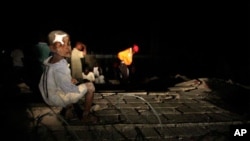Tuesday's earthquake in Haiti left some 300,000 people homeless. Many are clustering in public places without food, clean water or sanitation. It's the perfect environment for the spread of communicable disease.
The earthquake decimated Haiti's capital just days ago. But it's an eternity in terms of getting medical care to the injured.
Medicine and medical supplies, even sterile needles and thread to close wounds, are urgently needed. Meanwhile, doctors are doing the best they can. Dr. Hassan, with Doctors Without Borders, says, "For the moment we have a shortage of equipment. We are doing what we can do. We have already done a lot. We have helped a number of injured and we will continue to do so."
Help has been arriving. A U.S. aircraft carrier, equipped with supplies, operating rooms and water purifiers, has arrived in Port-au-Prince. The challenge is to get supplies to where they are needed.
International agencies estimate that up to three million people - a third of the population - may need emergency relief, a daunting task for any country, but especially an impoverished one like Haiti.
Dr. Jon Andrus from the Pan American Health Organization says no one knows how many people need medical care.
"In a city of two [three] million people, thousands of people probably at this moment are in need of medical care," he says. "You can imagine when you see those photographs, those homes in rubble, trapped people, it's just very, very difficult to estimate."
A small number of the injured have been flown to the U.S. for treatment. Some have made it to hospitals across the border in the Dominican Republic or to other countries such as Jamaica.
Crush injuries, head trauma, puncture wounds, burns and broken bones require urgent critical care before blood clots develop or infections set in. Surgeons, orthopedists, burn specialists and others are needed in large numbers.
Although bodies are decomposing on the streets, they are not a health threat.
Health officials are more concerned about large numbers of people living in public spaces without clean water or sanitation.
"I think the major focus will be the prevention of diarhreal diseases, the prevention of respiratory diseases, the link to try to reinforce and prevent vaccine preventable diseases," says Dr. Andrus.
Health experts are also concerned about hungry people eating contaminated food, and that the weakened immune systems of so many malnourished people could make them even more vulnerable to disease.




